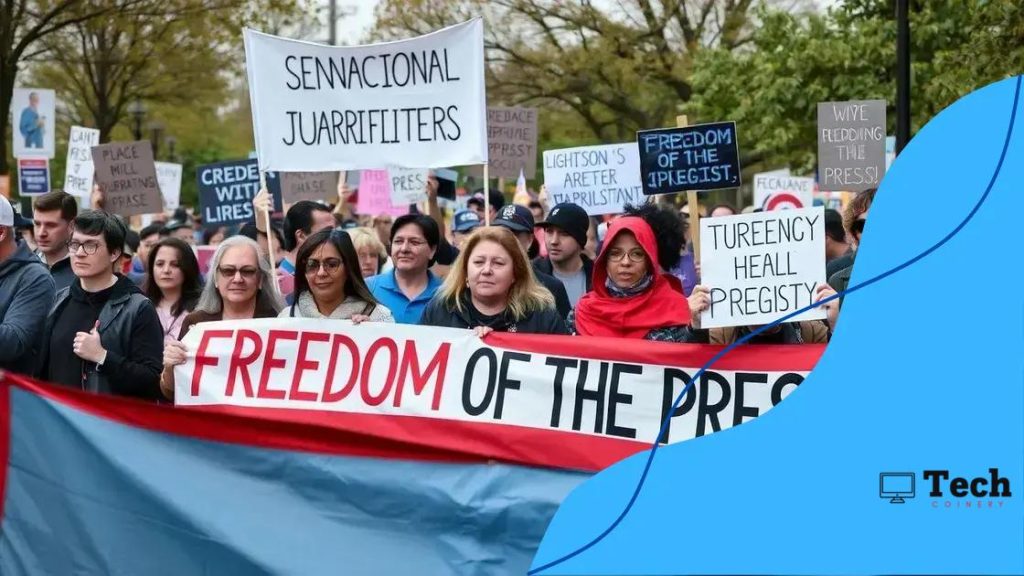Freedom of the press rallies: a call for transparency

Freedom of the press is essential for democracy, enabling journalists to report independently without fear of censorship, while overcoming challenges like safety threats, misinformation, and legal restrictions.
Freedom of the press rallies are much more than just gatherings; they symbolize the public’s demand for transparency and accountability in journalism. Have you ever wondered how these events impact our society?
Understanding the significance of press freedom
Understanding the significance of press freedom is key to appreciating its role in a democratic society. It allows journalists to report news without interference, ensuring that the public is well-informed. In essence, press freedom plays a crucial part in keeping government powers in check and upholding accountability.
Why Is Press Freedom Essential?
Freedom of the press is vital for several reasons:
- It fosters transparency, as citizens can learn about government actions.
- Informed citizens make better decisions regarding their leaders.
- A free press holds powerful entities accountable and exposes corruption.
- It enables diverse voices and viewpoints to be heard.
Additionally, history has shown us that when press freedom is restricted, societies suffer. For example, during authoritarian regimes, the absence of independent journalism often leads to unchecked abuses of power. People may find themselves unaware of critical issues affecting their lives.
Impact on Society
The influence of press freedom extends beyond mere information dissemination. It shapes public opinion and encourages civic engagement. When journalists investigate and publish stories on pressing societal issues, they spark conversations that motivate citizens to act.
Strong, independent media can also play a role in peacebuilding within conflicted areas, helping communities reconnect and heal.
Ultimately, the significance of press freedom cannot be overstated. It is a cornerstone of democracy that bolsters human rights and contributes to societal prosperity. Investing in and protecting this essential freedom is vital for a healthy democracy.
Key events shaping freedom of the press rallies
Key events have significantly shaped freedom of the press rallies worldwide. These rallies often arise in response to pressing issues concerning journalistic independence. Understanding these events helps highlight the persistent struggle for press freedom.
The Pentagon Papers Leak
One pivotal event was the release of the Pentagon Papers in the early 1970s. This top-secret document revealed the U.S. government’s decision-making during the Vietnam War. The publication led to widespread protests, emphasizing the importance of a free press in exposing government wrongdoing.
The Watergate Scandal
Another significant moment was the Watergate scandal. Journalists Bob Woodward and Carl Bernstein uncovered a massive political scandal involving President Nixon. Their investigation led to a national conversation about journalistic integrity and the ethics of holding power accountable.
- Exposing corruption in high office strengthened the role of journalists.
- Public support for press freedom grew as citizens recognized the media’s role.
- New policies regarding transparency were also considered.
Additionally, international events have inspired rallies for press freedom. The Arab Spring movements in the early 2010s saw a surge in demand for freedom of expression across several nations. As citizens fought against oppressive regimes, rallies advocating for press freedom emerged.
In recent years, incidents like the murders of journalists, such as Jamal Khashoggi, have triggered global outrage and increased support for freedom of the press. Social media has played a pivotal role in mobilizing support and raising awareness.
Overall, these key events highlight that the fight for freedom of the press is ongoing. They remind us that protecting journalistic independence is essential for democracy.
Voices from the ground: testimonials from participants

Voices from the ground reveal the heart of freedom of the press rallies. Testimonials from participants provide insight into why these events matter. Each story highlights the personal stakes involved in the fight for press freedom.
Personal Experiences
Many individuals attend these rallies to express their support for journalists. For instance, Maria, a dedicated activist, vividly recalls her first rally. “Seeing hundreds of people come together to support press freedom was inspiring. It reminded me that we all have a voice, and we must use it to defend our rights.”
Impact on Communities
Another participant, a journalist named James, shares how these rallies can transform communities. “I started as a local reporter, struggling to cover stories that mattered. Attending these rallies, I found allies who believe in the importance of a free press. Together, we can shine a light on issues that matter to our community.”
- Rallies create solidarity among journalists and the public.
- They promote awareness of issues facing press freedom.
- Participants often leave feeling empowered to take action.
- Voices from these events can change perceptions about journalism.
Moreover, participants come with diverse backgrounds and motivations, uniting for a common cause. Alex, a student, explains, “I joined because I believe that everyone should have access to the truth. Events like these give me hope that we can protect our journalists and their work.”
These testimonials underscore the power of collective action. They remind us that each person’s voice matters in the fight for freedom of the press. When people unite, they create a stronger movement that advocates for their rights and the rights of journalists everywhere.
Challenges faced by journalists today
Today, journalists face numerous challenges that threaten their ability to report freely and responsibly. These challenges affect both their safety and the quality of information available to the public. Understanding these obstacles is critical to recognizing the importance of freedom of the press.
Safety Concerns
The safety of journalists is one of the top concerns worldwide. Many reporters work in dangerous environments where their lives are at risk. In some regions, journalists are targeted for their work, facing threats, physical violence, or even death.
Censorship and Legal Issues
Censorship is another significant issue for today’s journalists. Many governments impose strict regulations on what can be reported. This limits journalists’ ability to uncover vital stories and communicate with the public. Legal battles over press freedom make it challenging for reporters to operate independently.
- Threats from authorities can lead to self-censorship.
- Journalists may be sued for defamation or face criminal charges.
- Access to information can be restricted through legal means.
- Journalistic integrity is often questioned, thereby complicating their work.
Moreover, the rise of misinformation poses another challenge. In a world flooded with information, distinguishing fact from fiction can be tough. Journalists must work harder to verify their sources and ensure accurate reporting.
Technological changes also present challenges. Social media has transformed the way news is consumed, but it also complicates how stories are reported. Journalists struggle to keep up with the rapid pace of news cycles, requiring them to adapt quickly.
These challenges illustrate that journalists today must be more resilient than ever. Despite the obstacles, dedicated journalists pursue the truth, proving their vital role in society. Advocating for their rights and safety is essential for maintaining a free press.
The future of press freedom: what lies ahead
The future of press freedom is uncertain, shaped by numerous factors. It is crucial to explore the potential challenges and opportunities that lie ahead for journalists and media outlets. As society evolves, so does the landscape of journalism.
Emerging Technologies
Advancements in technology are both a boon and a challenge for press freedom. On one hand, technologies like social media offer platforms for diverse voices and quicker dissemination of information. On the other hand, they also raise concerns about misinformation and the quality of news.
Changing Regulations
Governments worldwide continue to struggle with how to regulate digital information while protecting press freedoms. New laws may emerge, either supporting or limiting journalists’ rights. Advocates must stay vigilant to ensure that any regulations promote transparency and accountability rather than censorship.
- New legal frameworks may redefine journalistic protections.
- Increased corporate influence could shape media narratives.
- Digital rights will become more critical as technology evolves.
- Public engagement and activism can drive change.
The role of the public is also evolving. With growing awareness of the importance of press freedom, more people are advocating for its protection. Citizen journalism has gained traction, allowing ordinary individuals to contribute valuable perspectives and hold power to account.
As we look to the future, collaboration between journalists, government, and citizens can pave the way for a stronger vision of press freedom. Ongoing training and resources for journalists will be essential as they navigate these changes. Their ability to adapt will determine how effective they are in fulfilling their role in society.
The quest for freedom of the press will remain a vital part of democratic societies. By staying informed and engaged, we can support a future where press freedom thrives and contributes positively to global conversations.
FAQ – Frequently Asked Questions about Freedom of the Press
What is the importance of press freedom?
Press freedom ensures that journalists can report news without fear of censorship or retaliation, which is vital for democracy.
What challenges do journalists face today?
Journalists face threats to their safety, censorship from governments, and the rise of misinformation in media.
How does technology impact journalism?
Technology can enhance reporting and reach, but it also poses challenges such as misinformation and the need for rapid adaptation.
What can the public do to support press freedom?
The public can advocate for press freedom, support independent journalism, and stay informed about press rights issues.






